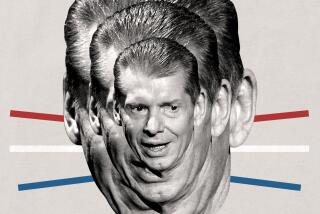Donald Keough dies at 88; helped Coke stay dominant during ‘soda wars’
- Share via
Donald R. Keough, a poor cattleman’s son who became president and chief operating officer of Coca-Cola Co. and helped it maintain its worldwide dominance during the “soda wars” of the 1980s, died of natural causes Tuesday in Atlanta. He was 88.
Keough rose to the No. 2 job at the beverage giant in 1981 and with Coca-Cola Chairman Roberto Goizueta helped steer it through a prosperous era when its global revenues more than doubled to $14 billion despite one of the worst marketing stumbles in business history.
Known as a skillful communicator, Keough played a major role in promoting and then retreating from a controversial 1985 decision to market “New Coke,” a sweeter reformulation of the original drink that was conceived to beat back Pepsi, which had been cutting into Coke’s sales.
But Coke loyalists instantly and massively revolted: They poured the new product down sewers, mocked the “Coke Is It” ad with the line “Coke Was It,” and overwhelmed the company’s switchboard with irate messages. After only three months, the company admitted its mistake and brought back the original version, which it called Coke Classic.
Despite the gaffe — and Pepsi’s efforts to exploit it — Coca-Cola never lost its preeminence in the soft-drink industry. Much of the credit for Coca-Cola’s recovery went to Keough for his eloquent mea culpa at a news conference in July 1985.
“We love any retreat which has us rushing toward our best customers with the product they love most,” said the executive, who called Coke’s appeal “a lovely American enigma.”
Keough, who spent more than 40 years at Coca-Cola, including 12 as president and chief operating officer, “brought a steady hand to the wheel in challenging times, unmatched operating skill that strengthened and expanded the Coca-Cola system and an expansive vision that helped make Coca-Cola a truly international brand,” Coca-Cola Chairman and Chief Executive Officer Muhtar Kent said in a statement announcing Keough’s death.
Donald Raymond Keough was born in Maurice, Iowa, on Sept. 4, 1926. After fire destroyed the family home, he moved to Sioux City where his father started over working in a stockyard. At 15, Keough began working in the stockyard too, and later said his experiences there taught him the fundamentals of business success.
Near the end of World War II, in 1944, Keough joined the Navy, helping to care for traumatized sailors at a Navy psychiatric hospital in Rhode Island. He later attended Creighton University in Omaha on the GI Bill.
After graduating in 1949, he was hired as a sports commentator at an Omaha television station, where he briefly produced a show for another TV neophyte, future late-night talk show host Johnny Carson.
Neither man stayed at the station long. Carson moved to Hollywood and Keough, in 1950, became an assistant advertising manager for Butter-Nut Coffee.
After a series of corporate takeovers, Butter-Nut became a unit of Coca-Cola, in 1964. Keough moved steadily up the ranks, becoming president of Coca-Cola’s food division in 1970 and president of Coca-Cola USA in 1974.
In 1981 many in the company expected him to become the next chairman and chief executive, but the top post went to Goizueta, a Cuban refugee who rose from Coca-Cola’s technical and engineering division. With Keough by his side, he led the conglomerate until his death in 1997.
“Many people felt Keough resented Goizueta, but if he did he certainly hid it very well,” said Mark Pendergrast, who wrote “For God, Country, and Coca-Cola: The Definitive History of the Great American Soft Drink and the Company That Makes It,” published in 1993.
“They formed a kind of good cop and bad cop,” Pendergrast said Tuesday. “Goizueta was smooth but aloof.… Keough was more of a common-man type. He had that slap-you-on-the-back, I’m-your-best-friend feel to him.”
Keough’s affable persona and public speaking skill helped him “steal the show,” according to Pendergrast, at the news conference at which Coca-Cola admitted the failure of “New Coke.”
The company’s announcement that it was bringing back the old Coke became front-page news around the world, generating so much publicity that some skeptics speculated that “New Coke” had merely been a promotional stunt.
Keough’s response was classic.
“Some critics will say Coca-Cola made a marketing mistake. Some cynics will say that we planned the whole thing. The truth is,” he said, “we are not that dumb and we are not that smart.”
“I think that will go on my tombstone,” he later told the Atlanta Journal-Constitution.
In 2008 Keough published a book based on a speech he gave about his business philosophy. He called it “The Ten Commandments for Business Failure.” As he often remarked later, he was especially glad he broke Rule No. 4 — “Assume Infallibility.”
Keough stepped down as president and chief operating officer in 1993 but found retirement unappealing. He became nonexecutive chairman of the New York investment banking firm Allen & Company and a director of Berkshire Hathaway, the investment company founded by his former Omaha neighbor and lifelong friend, Warren Buffett.
In 2004 he rejoined Coca-Cola’s board after it changed its age rules to seat him; he finally retired in 2013.
His immediate survivors include his wife of 65 years, Marilyn; their children Kathleen, Shayla, Michael, Patrick, Eileen and Clarke; 18 grandchildren and two great-grandchildren.
Twitter: @ewooLATimes
More to Read
Start your day right
Sign up for Essential California for the L.A. Times biggest news, features and recommendations in your inbox six days a week.
You may occasionally receive promotional content from the Los Angeles Times.







